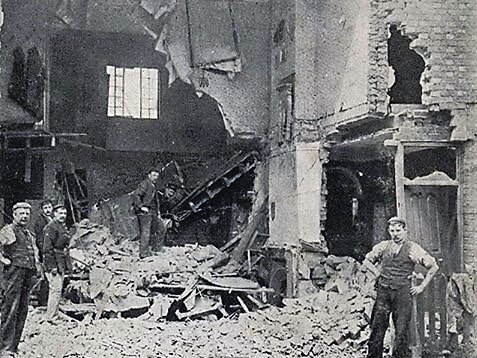Pioneers of Power – The origins of the Gas industry
We’ve covered several pioneers of power previously but those were the leading minds behind the electricity revolution. In this article, we take a look at the gas industry and the pioneers who helped light and heat our homes.
In the beginning
The origins of the gas industry we know today can be traced as far back as the 17th century when it was first demonstrated that coal, when heated, emitted a gas that burned with a bright flame.
In 1792, William Murdoch, a Scottish engineer put the gas to the test by using it to light his Cornish home. Impressed with what he’d done Murdoch’s employers the Birmingham based steam engine manufacturers, Boulton and Watt built small gas works to illuminate their factories.
Using gas for lighting soon took off when in 1807, German entrepreneur Frederick Albert Winsor demonstrated that gas could be used to light London’s streets.
Gas Lighting
A few years later in 1812, Winsor received a Royal Charter to construct the worlds first public gas works which opened in Westminster a year later. London was lit up by gas and over the next few years gas lightning was being used in every major town and city across Europe and North America.
His success saw his gas company go on to become the world’s largest despite his claims that entering a room full of gas when entered with a naked flame will never inflame because it is intermixed with the air of the room and that gas was ‘more congenial to our lungs than vital air’.
Needless to say, his claims were false, and many people perished as a result of gas explosions or suffocation in the early days.
It wasn’t until the late 19th century that most working people could afford gas lighting in their homes and most were simply naked flames prone to accidents.
Winsor’s gas company, the Gas Light and Coke Company supplied London’s gas until the UK government nationalised the industry in 1949.
Gas lighting was gradually replaced by electric lighting in the early 20th century due to the poor brightness of gas lighting. Today only a few cities have their gas street lights still in place as a way to preserve their historical character.
Gas Heating and other uses
It may seem strange to us today that it took so long for the public to accept the use of gas for other purposes other than lighting. One big hindrance to utilise gas for other things was the fact that the gas companies of the day prohibited the use of gas during the day.
The big breakthrough came at the Great Exhibition of 1851when the first gas ovens were put on display. These new inventions were hugely expensive and only the wealthiest could afford them.
Gas being used for heating was demonstrated by several pioneers of the gas industry but due to the cheapness of coal it would not be used to heat people’s homes until late in the 20th century.
It wasn’t until the environmental impacts of coal became prominent in the public consciousness that gas really took off. The Clean Air Act of 1956 restricted the use of solid fuel burning in urban areas forcing people to seek out alternatives. Gas heating was the natural choice. Gas fires and boilers increased in popularity as a result.
Industrial and business use
As with the public gas usage took a long time to be adopted by industry and businesses. The first time gas was utilised in industry was during the Industrial Revolution when textile mills used gas flames. Glass manufacturers, tinsmiths and jewellers all adopted gas in their workshops.
The invention of Gas engines in the 1860s was a game changer as they were smaller and more flexible than steam engines. These gas engines were used to power factories and public tramway systems up and down the UK.
Natural Gas and the modern era
The modern era of the gas industry began in 1960 when Natural gas introduced to the UK. It was a cleaner and cheaper gas that was favoured by industry and manufacturers.
Large reserves of natural gas were discovered off the coast of Yorkshire in the 1960s and the UK gas industry decided to supply the gas directly to consumers rather than use it to make manufactured gas.
As a result, all older gas appliances had to be replaced, a feat that that was accomplished over a ten year period. Modern energy suppliers and the government are likely to be hoping that a similar achievement can be made to replace gas boilers and heating systems with heat pumps and other cleaner sources such as hydrogen and bio-methane.
Also read:
Replacing the heating system of every UK home could take 1000 years at the current rate says report
Entering the gas market
In order to enter the UK gas market, all energy suppliers must have a gas supply licence. The gas supply licence is issued by Ofgem and applies to all transporters, interconnectors, shippers, and suppliers, and is issued by Ofgem.
Read our guidance on obtaining a gas supply license HERE
For one-to-one advice or for information on our energy supplier CRM system and billing software, please get in touch.
Further Reading
Gas Dataflow Management System
Xoserve and Gas Organisations in the UK
How can smaller energy suppliers be competitive?
Dyball Associates are proud to help new supply businesses successfully launch in the UK market.
Through our energy market consultancy services, and the software we've developed, we're supporting new UK electricity and gas suppliers get set up and start supplying.
Follow us on LinkedIn to keep up to date with the latest
news
and updates in the energy industry.






